Hardly six days had passed since Vladimir Putin ordered his army into Ukraine that the name of a dreaded group of Russian mercenaries began to circulate again.
According to the British daily The Times, more than 400 armed members of the Wagner Group were flown in from Africa five weeks previously. Their mission : to assassinate President Zelensky, neutralize the government and prepare the ground for Moscow to take control, in return for a handsome financial bonus.
On 26 February, the Ukrainian government learned of the presence of the mercenaries thanks to a note from its secret services. A few hours later, a 36-hour “hard” curfew was declared in order to comb the city for Russian infiltrators and saboteurs. Civilians were warned that they would be seen as Kremlin agents and risked being ‘liquidated’ if they came out into the streets.
Opacity, crime, and impunity. This is how the Wagner Group, a private army of mercenaries working on behalf of Russia, could be defined. They are found in countries around the world, where they are employed – officially – as security personnel. Some of their abuses have reached such a degree of violence that the highest international authorities have voiced concern. Especially since journalists who sought to investigate this occult, private army have been murdered.
It is a familiar story. A superpower goes to war and faces a stronger-than-expected insurgency in foreign lands yet has insufficient forces to counter it because of political and military constraints. The superpower decides to hire contractors, some of whom are armed, to support its war effort. The armed contractors prove to be both a blessing and a curse, providing vital security services to the campaign yet at times, killing innocent civilians in their zeal, causing strategic setbacks and damaging the superpower’s legitimacy. Without these contractors, it would be hard for the superpower to wage war, but with them, it is difficult to win.

It would probably be very useful to clarify at the outset what private military companies (PMCs) and mercenaries are, and the fundamental difference between the two. Mercenaries—from the Latin word merces for reward—are individuals who take part in a foreign conflict in exchange for money or any other material gain. Mercenaries are not motivated by parameters such as ethnicity, ideology, religion or political views. The only factor that ties them with the party for which they are fighting is profit. Mercenary activity has been defined by the UN and is recognised by numerous states as an illegal activity and individuals that fall within this category are prosecuted accordingly under domestic laws. Furthermore, mercenaries are unlawful combatants and thus are not granted prisoner-of-war status if they are captured during a conflict. Genuine PMCs on the other hand are legal entities providing services that would normally be assigned to the armed forces of a country. PMC work ranges from intelligence analysis and consulting to training on tactics and protection services. There are many instances where PMCs have been actively involved in an armed conflict, acting always on behalf of the legitimate authority of a given state, with rules and terms defined by a mutual contract. In developed countries, PMCs are a well-established business area, involving tens of thousands of people, and profits often measured in billions of dollars. But in developing countries, PMCs are a phenomenon that go from a “gray” zone, dangerously balancing between service to the state and the status of an illegal armed group. And this is why in many instances, the concept of PMC has been erroneously applied to mercenary groups who fight primarily for profit rather than politics.
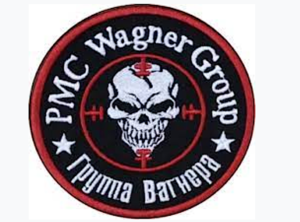
Be that as it may, the volumes of the world market for PMCs are huge. According to the estimates of the London-based, non-profit organization, War on Want, the market for military consulting services has an annual turnover of $100 billion to $400 billion.
PLAUSIBLE DENIABILITY
In Russia, the history of PMCs as we know them today goes back to the 1990s, when the first so-called “Russian volunteers” went to fight on the Serbian side in Yugoslavia. It is safe to say that the Russians could not go abroad with weapons and combat gear and participate in hostilities without the authorisation of the Russian leadership. Without the participation of Russian intelligence and the Russian government, this would have been quite impossible. It was under the same scheme that the Kremlin sent mercenaries linked with the intelligence services of the Russian Federation to Transnistria and Nagorno-Karabakh, and later to Chechnya, Crimea, the Donbass region in eastern Ukraine and Syria under the guise of “volunteers inspired by the ideals of protecting Russia’s interests”. However, there came a moment when the activities of PMCs in Russia had to be regulated. This would not only legalise the participation of Russians in private military companies, but would also enable the Kremlin to create PMCs legally to achieve its military and political goals outside of Russia. One of the first attempts to resolve the issue of PMCs and their involvement in Russia’s attempts in taking over oil and gas resources overseas was the amendments to the Russian law on arms in 2008, which entitled the foreign security personnel of giant oil companies such as Transneft, Lukoil and Gazprom to use duty weapons to ensure the security of oil facilities.
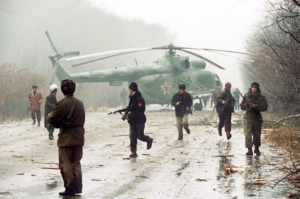
On the eve of the 21st century, Russia was experiencing rather difficult economic and social conditions, and coupled with the general devastation at the turn of the millennium, a civil war began in Chechnya that required significant human resources. This further destabilised Russian society as well as the economy. It was only after the end of the second Chechen campaign in 2009, when thousands of young men who had volunteered to fight were left out of work, that the idea of organising and supervising PMCs began to take shape within the military establishment. But despite numerous attempts to regulate this tool, the official status of PMCs in Russia remains unsettled at the legislative level. One of the most talked about and yet most shadowy Russian mercenary units is of course, the private military company known as the Wagner Group. The Wagner Group – which does not exist on paper – got its name from its purported founder and commander, the elusive Dmitry Utkin who chose “Wagner” as his nom-de-guerre in honour of Adolf Hitler’s favourite composer. His men have told reporters that they have seen him on the Ukrainian front and in Syria proudly wearing Wehrmacht military caps and helmets on a number of occasions. Dimitry Utkin was born in June 1970. He was a lieutenant colonel and brigade commander of a Special Forces unit of the Russian Military Intelligence or GRU until 2013. After retiring, he became the commander of a unit of mercenaries fighting in Syria that lost a battle with Al-Qaeda-linked militants. The Syrian mission ended up in shambles, with Russia’s FSB arresting many of the returning mercenaries and charging them with “unlawful warfare abroad“. This is the requisite crime for mercenary work which is officially illegal in Russia.

By early 2014, however, many of the people who were involved with the mercenaries who fought in Syria were back in demand. As Russia needed quick – and deniable – military presence in Crimea, the concept of a private, legally unincorporated shadow army employing skilled soldiers with prior combat experience appeared to be the perfect solution. While Dmitry Utkin has been widely presented as the front man of the Wagner Group, there is ample data suggesting that his role was more that of a field commander, and that the mercenaries are integrated in an overall chain of command under central Kremlin control, with its military intelligence or GRU apparatus. The Wagner Group is a closed paramilitary structure with a training camp located in the village of Molkino, near Krasnodar in southern Russia. It is situated at a facility belonging to the 10th Special Mission Brigade of the GRU Special Operations Forces. It is highly unusual for any private company to share a base with an elite military unit, and it is particularly odd that GRU personnel guard the road leading to the barracks of a PMC. The fact that Molkino base operates the way it does implies that relations between the two organisations are indeed cordial. After all, Wagner isn’t just a private security company that protects the Kremlin’s interests…it is an essential and deniable component of Russia’s warfare strategy. At the end of their training course, the mercenaries are given weapons, maps and any other tool needed for the task at hand. But they will not ask any questions…they will already have made a signed statement to that effect. These private soldiers are hired to go into combat and whoever is sending them can, and will deny knowledge or responsibility for the events on the ground, however catastrophic.

This fact was demonstrated in spectacular fashion following what was the most serious confrontation between the United States and Russia since the Vietnam war. In February 2018, a US airstrike in the Deir el-Zor area of eastern Syria targeted groups of pro-Syrian regime fighters, as well as columns of Russian tanks advancing towards the Conoco gas plant. Syrian Democratic Forces (SDF), supported by the United States were in charge of protecting the gas facility. Among the killed were hundreds of Russian mercenaries belonging to the Wagner Group. The Russian government naturally made great efforts to downplay and even ignore this incident. Subsequently, while the most fanciful figures were advanced from all sides, Moscow admitted that “several dozen nationals of Russia and the Commonwealth of Independent States [former Soviet republics] had been killed or injured in American strikes that occurred on February 7 at the Syrian town of Deir el-Zor”. This statement from the Russian Foreign Ministry on February 20 added that the Russian citizens had traveled to Syria “of their own free will and for various purposes”, and were not part of the Russian military force deployed in the country. Despite a salary of 4,000 euros per month, Wagner combatants feel that they have been used as cannon fodder rather than as elite troops. They are indignant, above all, that Russian law treats them as criminals and threatens them with eight years in prison while they work for the interests of the motherland, and that the Ministry of Defence, they claim, secretly protects them.
YEVGENY PRIGOZHIN : THE BOSS
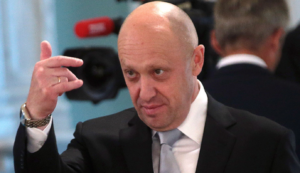
Yevgeny Prigozhin, the 60 year-old man with the shaven head and wary look on his face, can be described as the Renaissance man of deniable Russian black operations. His knack for profit led him on an unconventional path into Vladimir Putin’s confidence. After serving nine years in prison for robbery, fraud and forcing minors into prostitution, he began his legitimate business career in the 1990s by opening a hot dog stand. As the Soviet Union folded and Russia’s private sector burgeoned, he invested in St. Petersburg’s first grocery chain and eventually opened a luxury – by Russian standards – floating restaurant where he first personally served Vladimir Putin. The Russian president subsequently named him the official caterer of the Kremlin, thus earning him the nickname “Putin’s chef”. But he is much more than someone’s cook ; he is a an extremely wealthy man. His official business is a sprawling catering consortium that provides meals to millions of Russian soldiers, policemen, prosecutors, hospital patients and schoolchildren in return for hefty tax-funded payments estimated at $3 billion at least, since 2011.
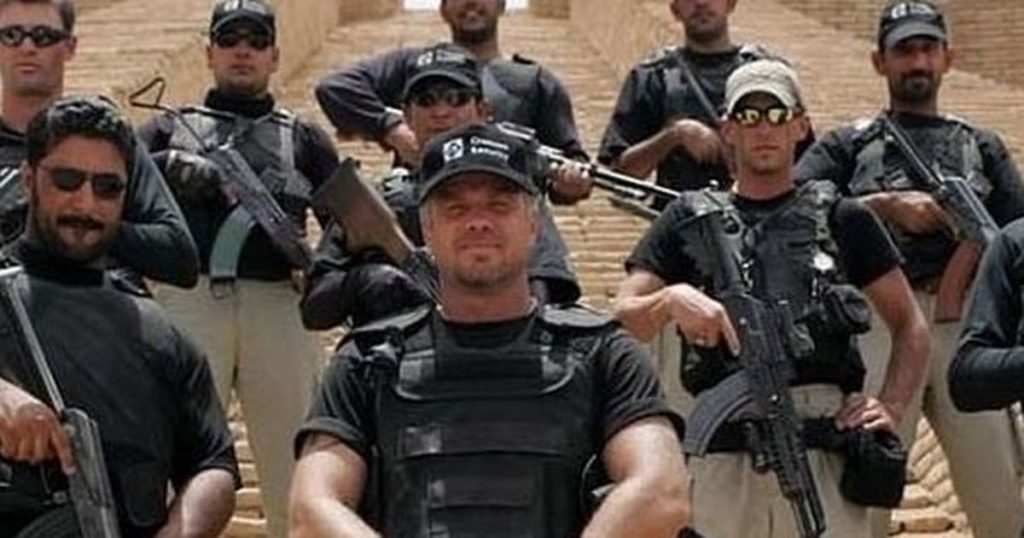
In 2019, a London-based Russian media outlet, The Bell, which is highly regarded for its serious journalistic work, called senior Defense Ministry and FSB officials in Moscow to testify, without revealing their names. They claimed that it was Russian army generals who, in 2012, came up with the idea of creating a private army, “that could be employed to solve problems by force, if necessary”. According to the same officials, it was these newly-recruited soldiers who proposed that the businessman who became wealthy by feeding millions of Russian soldiers should be the one to finance and manage this shadow army. After all, equipping and feeding a private army is very expensive. The Russian media outlet RosBiznesConsulting (RBC) estimated the cost of Wagner’s campaign in Syria at $100 million. Initially, Prigozhin did not want to take on this dangerous responsibility. But in the end, he reportedly relented so as to save his lucrative business with the state. Progozhin’s operations fit the profile of an authoritarian state’s shadow security apparatus : industrial-scale manufacturing of fake-news, intimidating journalists, election interference, political engineering, and actual clandestine military operations. He funds the Internet Research Agency ‘Troll Farm’ and was famously indicted in the US for trying to influence the 2016 elections in favour of Donald Trump, a charge he flatly denies to this day.
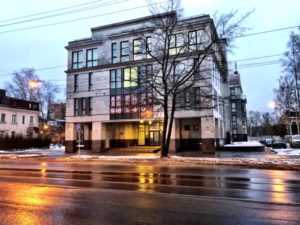
His troll-factory generated one of the largest known online disinformation campaigns by churning out 71,000 tweets aimed at presenting Russia’s version of events in the downing of Malaysian Airlines flight MH17. The same troll infrastructure posted thousands of messages promoting Brexit. Now, a long-running investigation by independent journalists has uncovered that Yevgeny Prigozhin’s disinformation, political interference and military operations are tightly integrated with Russia’s Defence Ministry and its intelligence arm, the GRU. Prigozhin’s private infrastructure, along with that of other government-dependent entrepreneurs, serves as a deniable veneer and a round-tripping money laundering channel for government-mandated overseas operations. Stephen Blank, a Russia expert at the Philadelphia-based think tank, Foreign Policy Research Institute sums it up thus : “The phenomenon of private entrepreneurs – who in reality are not private – in Russian policy goes back to the Tsars, who used people. This gave them plausible deniability and also relieved the stress on the state budget ; they don’t have to pay for it…the private entrepreneur pays for it. But this has become ubiquitous under Putin”. Wagner’s deep connections with Russia’s top political leaders distinguish the company from its contemporaries. The contractors’ appearance in geopolitical hotspots illuminates close coordination between Prigozhin’s commercial aspirations and the Kremlin’s pursuit of national interest.
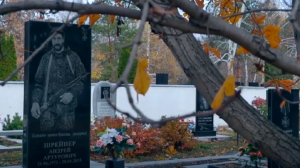
Prigozhin profits by providing services in the countries where Russia is expanding its engagement, while the state maintains plausible deniability by utilizing Prigozhin’s private structures. In the process, Prigozhin accumulates prestige and political capital, paving the way for future lucrative contracts. Professor Kimberly Marten is Chair of the Political Science Department at Columbia University in New York : “Whether Putin is in power or whether someone else replaces him in the future, the Russian system itself makes these moves unpredictable. That’s because decisions in Russia are made by informal networks of people who are connected to each other, maybe because of past employment history, maybe because they grew up in similar towns, but all the decisions are made by these very opaque, hard to figure out networks”. At the same time, Prigozhin’s attempts to take initiative and leverage his crucial role for personal gain has also resulted in embarrassment for the Kremlin. First, there was the failed operation to capture oil-wells from the Syrian Defence Forces and the U.S. military in the province of Deir ez-Zor in February 2018. Wagner mercenaries suffered heavy casualties in a U.S. counter-attack that left the Kremlin scrambling for an appropriate reaction which never came.
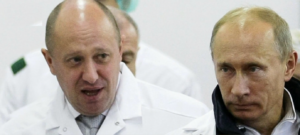
And then, on another occasion, Wagner mercenaries posted self-incriminating videos onto semi-public online groups, such as a gruesome chronicle of the torture, murder and beheading of a Syrian civilian near the town of Palmyra. Mohamed Taha Ismail, a 31-year-old Syrian in socks and navy tracksuit, groans in pain, lying on the cement floor of a dilapidated factory. Laughing, a young blond man with sunglasses breaks his hands with a sledgehammer. Later, another man in a striped tank top separates his head from his dead body with a knife, then proceeds to cut off an arm with a shovel. “Harder! Break the vertebrae!” shouts another armed man.
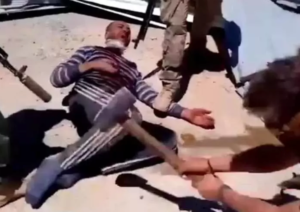
These are the torturers; four armed, young Russians in military fatigues, who film the scene with music blaring. Finally, they hang the decapitated man by the legs to a post, then set him on fire while joking about a “barbecue skewer”. In November 2019, former St. Petersburg police officer Denis Korotkov, now a reporter for the Russian opposition newspaper Novaya Gazeta discovered these images. He set about trying to solve the mystery of this anonymous video that had been circulating on the web since 2017. In one image, one of the men appeared without a head covering. That’s all Korotkov needed to identify him on a social network with facial recognition software. His name is Stanislav Dychko. The journalist looked for the name in a confidential document he had recovered, which listed Russians who fought in the Wagner Group. Dychko was well and truly on the list. Yet astonishingly, the Wagner Group, like all mercenaries are illegal in Russia. But that has proved to be a useful lever because it means that the people who are serving in the Wagner Group have a very strong incentive not to break their word of honour in terms of being disloyal to Prigozhin or to the Russian military. Basically the entire Russian system runs in grey zones. And it works, because then the people who are in charge can make sure that their friends are the ones making a profit and are not arrested for whatever it is that they’re doing.
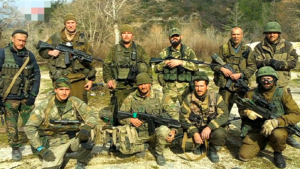
Stephen Blank also has this to say about the system : “Other businessmen presumably are involved in one way or another in financing these kinds of what you might call gray area phenomena or under-the-radar military operations. But they are military operations; they are part of a broader, national security strategy to upend the West, unhinge Western societies and advance Russian national interests. At the same time, there are thousands of men involved in various paramilitary groups. And they are outside the regular chain of command: they belong to Putin, as does the State ! This is a complex phenomenon which is part of the larger Russian national security strategy of non-linear, fifth generation, hybrid, whatever you want to call it war”.
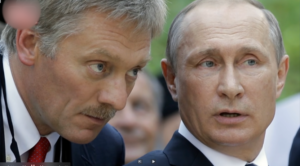
The Wagner Group’s tentacles stretch from conflict zones in Ukraine and Syria to guarding mines in the Central African Republic and other countries. The Kremlin, the Russian military and oligarchs are all involved, though it’s hard to pin any of the group’s actions on the Russian leadership. But in December 2016, the Kremlin’s deniability of any formal links to the Wagner Group famously came undone after Utkin was spotted during a video broadcast from a reception at the Kremlin. After initially denying any knowledge of Utkin’s existence, Putin’s press secretary Dmitry Peskov ultimately acknowledged he had attended the Heroes of the Fatherland gala event at the Kremlin. Subsequently, a photograph was published in which Putin is seen standing next to four, heavily and apparently recently decorated Wagner officers at a Kremlin function.
AFRICA AT THE MERCY OF WAGNER
Since 2014, the Wagner Group’s actions, first in Ukraine and then in Syria provided the force with extensive war experience outside Russia’s borders. It was now time to shift its attention elsewhere. There is hardly any doubt that Africa is Russia’s new-found love. As Moscow attempts to regain influence that the Soviet Union once had in parts of the Global South, Russia views Africa as a “‘low-cost, high-profile’ opportunities” continent. In various African countries, Moscow is helping Russia-friendly governments strengthen their armed forces while also providing election strategies. The Kremlin is focused on backing African regimes that may face internal threats, or are somewhat isolated internationally, ultimately referring to this as the “Syria model“. Stephen Blank of the Foreign Policy Research Institute think tank has studied the phenomenon closely : “In the Middle East today, the presence of the Russians and their success has not only emboldened Russia to go into Africa, it has enabled them to find enablers like the UAE which makes no bones about it. They are helping them to get into Africa and use the UAE for purposes of getting access to mineral resources or energy contracts or creating long-term, lasting political influence or creating a basis for Russian arms sales to African countries, which is a big deal and of growing importance”.
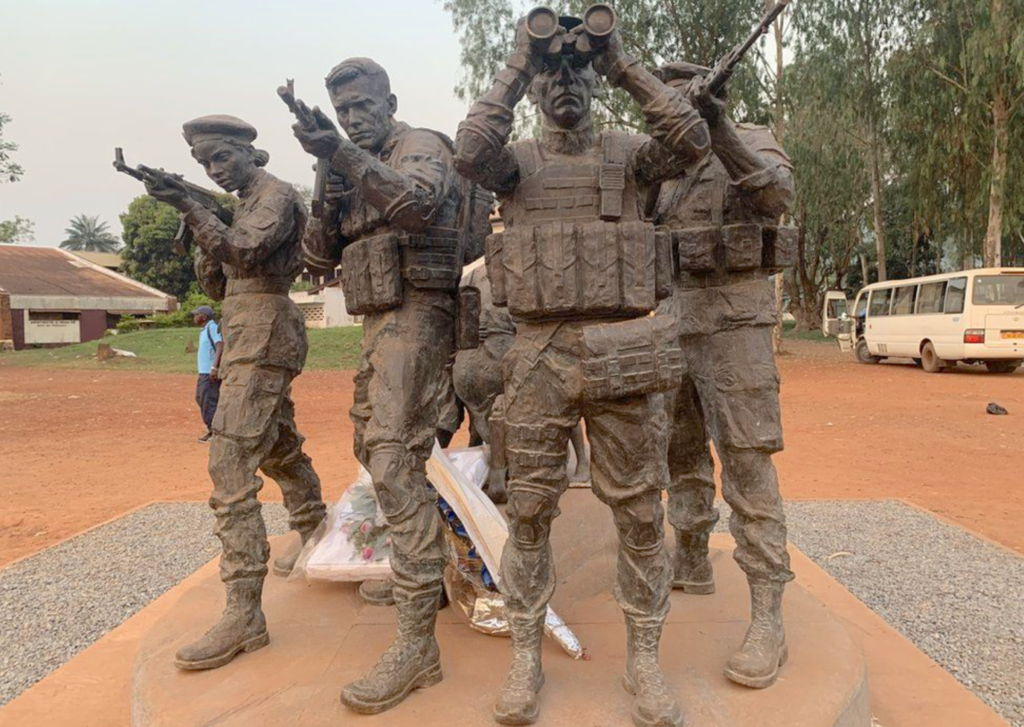
As the Kremlin sees it, Russia must build on this history and existing Russian-African networks established in the Cold War era to position Moscow as a capital for African governments to turn to for deeper relations. Libya’s conflict is one example of the Russian military company playing, what some experts understand to be, a game-changing role. Beginning in 2019, the Wagner Group, through Yevgeni Prigozhin has been providing a major boost to General Khalifa Haftar’s self-styled Libyan National Army (LNA) amid the commander’s campaign to topple the UN-recognised Government of National Accord, and take over Tripoli. In November 2018, General Haftar met high-level Russian defence officials in Moscow. In videos and photographs of the event, Prigozhin is seen participating in the meeting. Informed Russian military and diplomatic sources have since confirmed that it was Prigozhin himself who had made the arrangements for this top-level meeting at the Russian Defence Ministry. Only months later, reports came in of Wagner mercenaries supporting the LNA, whose leader the Kremlin has quietly but steadily backed. Russia has displayed interest in Libyan energy resources, including a 2017 oil offtake deal, and it will probably pursue further investment as opportunities for Libyan conflict resolution emerge. The Wagner Group, its CEO, Yevgeny Progozhin and its founder, Dimitri Utkin have all been under European sanctions since December 2021. But this has not prevented them from signing contracts in the Central African Republic, the Democratic Republic of Congo, Rwanda, Angola, Zimbabwe, Lesotho, E-Swatini, Botswana, Madagascar, Guinea, Guinea-Bissau and more recently in Mali, although this has not yet been confirmed by the transitional military authorities in that country.
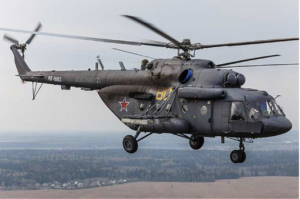
Even if this fact seems to have been denied by what President Vladimir Putin has said, he was careful not to mention any link with the Russian private military company. However, the Russian president did implicitly confirm that Russia has a strong military presence on the African continent. There are now about forty military assistance agreements that have been signed with African countries, including the one signed in June 2019 with Mali, to which Vladimir Putin was referring.
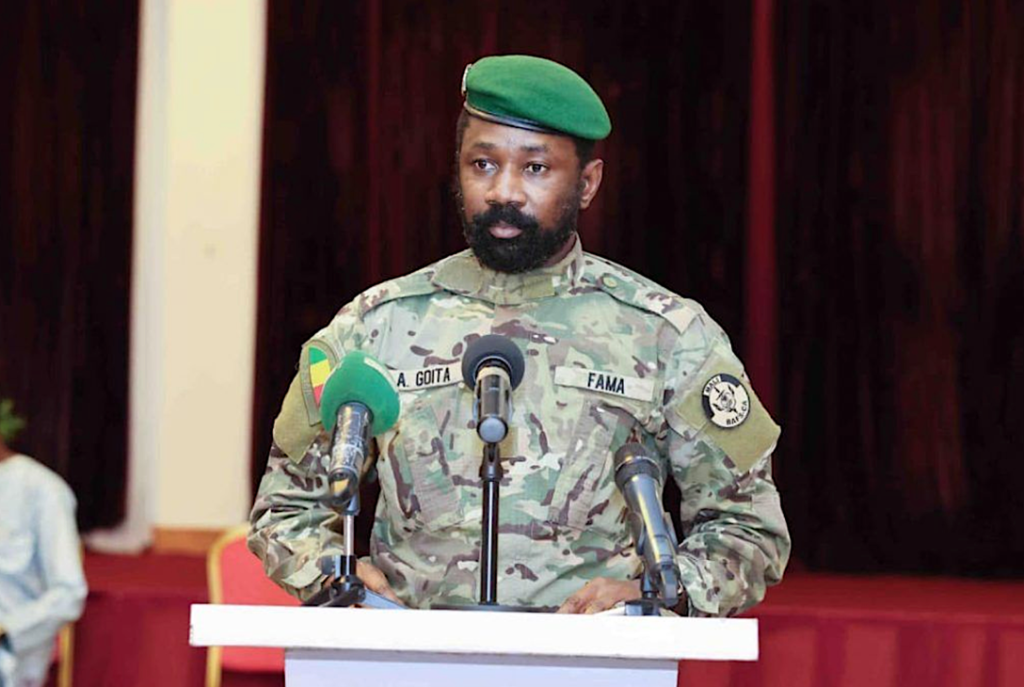
It was under this agreement that Russia delivered four MI-17 attack helicopters, weapon and ammunition to Mali in September 2021. The scale of bilateral cooperation between Moscow and Bamako is, moreover quite well known and quantifiable. According to the Stockholm International Peace Research Institute (SIPRI) this aid had reached the sum of $23 million in 2020.
STRANGLEHOLD ON THE CENTRAL AFRICAN REPUBLIC
Fighting between rebel groups in the Central African Republic (CAR) began in 2013 when former president François Bozizé was overthrown by mainly Muslim rebels. France, the former colonial power intervened militarily under a UN mandate and shortly after that, a UN peacekeeping mission was set up to stop the fighting, before it turned into a genocide. But French forces eventually retreated from this part of the continent as the US also reduced troop levels. But there came the concern of Russia and China stepping in to threaten US interests on the African continent. John Bolton who was National Security Advisor under President Trump had sensed the danger in 2019 : “Great power competitors, namely Russia and China are rapidly expanding their financial and political influence across Africa. Across the continent, Russia dances its economic and political relationships with little regard to the rule of law or accountable and transparent governance. It continues to sell arms and energy in exchange for votes at the United Nations, votes that keep strong men in power, undermine peace and security and run counter to the best interests of African people”.

Russian involvement in the Central African Republic (CAR) also links political support with economic gain. In fact, Russia outhustled France to obtain an exception to the United Nations arms embargo on the CAR in 2018. Wagner contractors entered the country around the same time In unstable, conflict-ridden countries with historically weak or failed states such as the CAR, where Moscow and Paris compete to be Bangui’s top partner, the Wagner Group’s activities aimed at establishing new security environments on the ground have been pivotal to Russian strategies aimed at countering competitors on the international stage. Hundreds of Russian fighters, referred to as army reservists, have been training government soldiers in preparation for deployment along the borders. And there is no shortage of weapons here; enough to prepare young recruits, many of them former members of rival militia groups. But now, under Russian command, they serve under the same flag. The Russian trainers, members of the Wagner Group are all masked; they clearly don’t want to reveal their identities as they are also providing security for President Faustin-Archange Touadera.
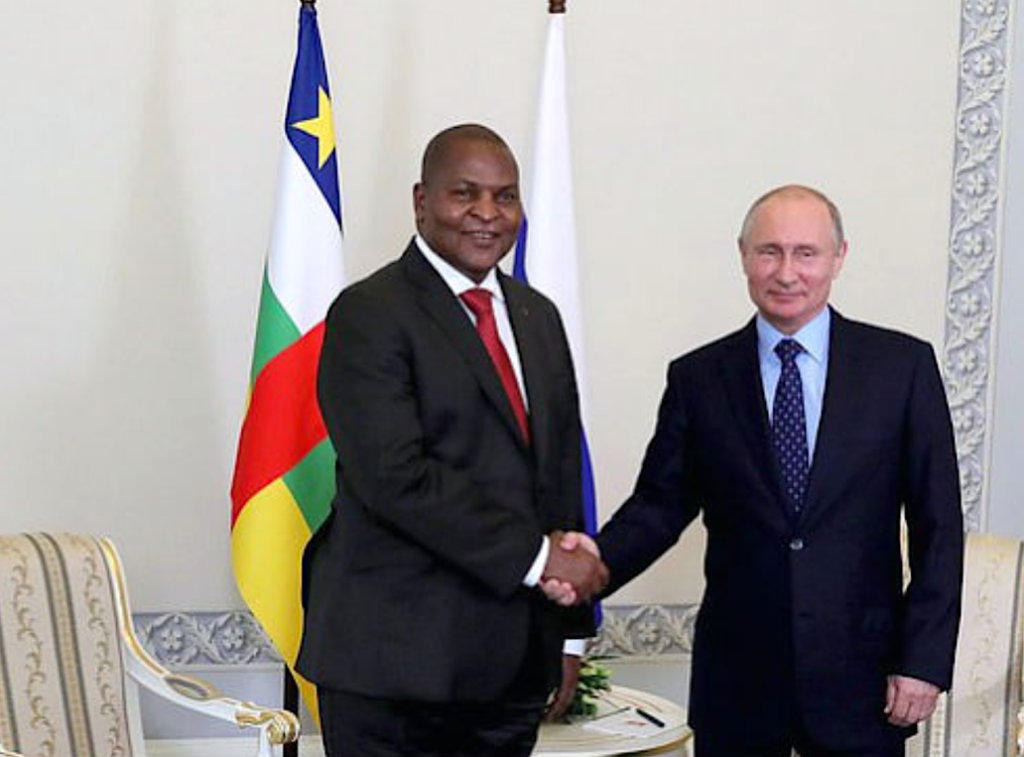
While Russia hopes to appear as a source of regional stability, this aid of course, does not come for free. The CAR has abundant reserves of diamonds, oil, gold, and uranium, and the Russian Foreign Ministry has discussed mining concessions with President Touadera who sees these as a form of payment to Wagner.
A CUT-THROAT BUSINESS
When Prigozhin goes in and provides consulting services, either personal protection services to a dictator or election support services or mercenaries who can be helpful in guarding certain strategic assets in a given country, he paves the way for other Russian corporations to do business in those countries. Although Russia has ingratiated itself with Touadera, it has also met with CAR’s rebel groups, playing the field to obtain access to resource-rich territory. Lobaye Invest, a St. Petersburg company closely associated with Yevgeny Prigozhin has already initiated diamond extraction, and Wagner contractors again appear to be guarding the mines. The dividends inherent in Prigozhin’s role in Russian geopolitics are paying off, and Wagner provides the muscle to defend them. This fact was sadly demonstrated when three Russian journalists investigating Wagner’s presence in the CAR were murdered in the summer of 2018. The slain journalists, Kiril Radchenko, Alexander Rastorguyev and Orkhan Dzhemal were tracking Wagner, but on the date of their deaths, they intended to film the Ndassima gold mines, which Prigozhin planned to exploit.
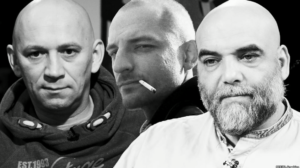
The trio were shot dead after the vehicle in which they were traveling was attacked on a remote road. The official explanation of their death was that they were victims of rebels or bandits. But that story never quite added up. Nothing of value was raken from the vehicle and their driver survived, unscathed. In fact, phone records later showed the journalists’ driver frequently contacted a CAR police officer with close ties to Wagner, including phone calls on the day of the murder. The journalists were in the Central African Republic on a trip sponsored by the Centre for Investigation, a now-closed online news organisation funded by exiled Russian businessman, philanthropist and fierce Putin critic, Mikhail Khodorkovsky. However, given the sensitive nature of the subject of the jounalists’ investigations, their deaths raised more questions than answers. Two years after the events, much work had been done to try to shed light on the circumstances of these murders. The Dossier Center which tracks the criminal activity of people associated with the Kremlin and also founded by Khodorkovsky, conducted an in-depth investigation. Mikhail Khodorkovsky resumed the facts thus : “Today, we can say with full confidence that the slain Russian journalists were working in the Central African Republic under the surveillance of people related to the local authorities, as well as of people related to the Russian citizens who work for the CAR’s government. The extent to which these people played a part in this tragedy remains to be determined. We know how to determine this. Unfortunately, the official investigation is not following this path, but we are following it. Today, we can firmly say that involvement took place, it was serious involvement, and we can prove it”.
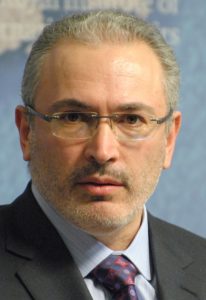
The history of the Central African Republic as well as that of countless other African nations has been marked by deep-rooted poverty, ethnic tensions and pervasive political instability for a long time. More recently, UN experts have reported on “serious human rights violations” committed by Russian security companies in collusion with local police and the military. This highlights the atrocities, war crimes and human rights abuses perpetrated by Wagner and other Russian operatives whose methods of fighting against the opposition correlate with those used by the FSB in Russia, including arbitrary detentions and forced disappearances.
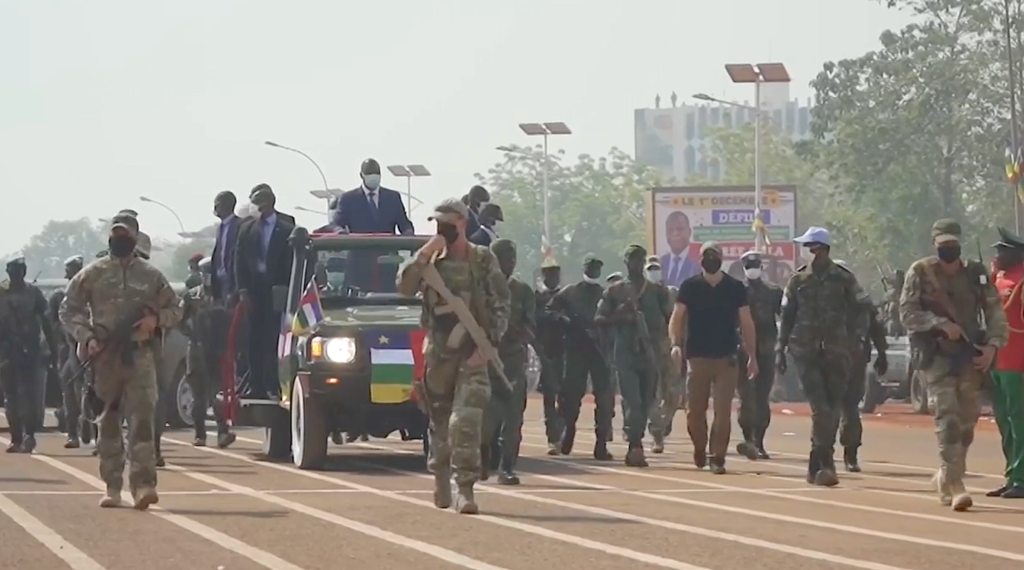
But contrary to Russia and Syria, the Central African Republic is a State Party to the International Criminal Court and ratified the Rome Statute in 2001. Therefore, the Court has full jurisdiction over crimes committed by all foreign powers including Russian PMCs, rebel factions as well as all government forces in that country. Mahamat Said Abdel Kani, a 50 year-old commander of the Muslim-dominated rebel coalition Séléka, responsible for widespread violence in the country in 2013, was handed over by authorities in Bangui to the custody of the International Criminal Court (ICC) in 2021. Two other suspects in the violence in the CAR are currently on trial at the ICC.
A CULTURE OF IMPUNITY
More than three decades after the Berlin Wall fell, Russia’s influence in Africa is far less than what the Soviet Union exercised in the post-Stalin period. Yet Moscow has fully realised how it can capitalise on the history and legacies of Soviet-African relations in the present era through the political, educational, and economic links that outlived the Soviet Union’s existence. This parallels Putin’s foreign policy strategies in other regions too, such as the Middle East and Latin America, where Russia has capitalised on its Soviet past to grow its power as it rivals other governments for geopolitical clout.
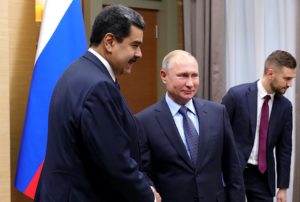
It took Kremlin spokesman Dmitry Peskov two tries to deny it. “Of course not,” he finally said with some embarrassment, during his televised appearance on the Russian TV channel Rossiya 1, in January 2019, while trying to refute the idea of the arrival of 400 Russian mercenaries in Venezuela. A Reuters report had earlier located them in Caracas where they have been assigned to protect President Nicolás Maduro. But the mercenaries hastily dispatched to Venezuela will have quite a delicate task this time; to put their hands – on behalf of Moscow – on the billions of dollars of contracts signed by Nicolás Maduro that include $5.5 billion in mining deals with companies such as Canada’s Barrick Gold Corp and China’s Shandong Gold. Through Wagner, Russia offers military support or political stabilization in return for political influence, opportunities for geostrategic expansion, or resource concessions. Wagner can be considered a private military company only to the extent that it feeds the wealth of a private individual, but the reality of its integration into Russian command structures renders it an entirely different animal. The European Union is a powerful political entity and it can also take action by applying more pressure on the African Union, the World Bank and various other international institutions to help create a culture of accountability. However, the impact of corruption must never be underestimated. Roughly 43 per cent of Africans are living in poverty while according to some estimates, US$50 billion worth of stolen assets flow out of Africa every year. It’s when desperate African dictators begin to give away their countries’ resources to Russia in exchange for military and political support that individuals such as Prigozhin and companies such as Wagner promptly appear on the scene. Prigozhin has not just been cooking and dishing out food to the Kremlin and the Russian military. He has in fact been serving Putin with Africa. He has received no gleaming military awards or monuments, but by deploying Wagner across three continents, Putin has thanked him by facilitating the global extension of his commercial reach. As long as embattled and inept leaders of politically unstable countries agree to work with Putin and offer sources of profit to Prigozhin, this model of fusing geopolitical pursuits and private enterprise will endure.

According to the United Nations working group on the use of mercenaries, the nature of contemporary conflicts and the involvement private military companies have undermined the implementation of existing norms. These include the African Union (AU) Convention for the Elimination of Mercenarism and the UN International Convention against the Recruitment, Use, Financing and Training of Mercenaries. The latter has not been signed nor ratified by any of the five permanent UN Security Council members. Clearly, the private military company market shows no signs of slowing down. While mercenaries are not a new feature on the world stage, the increasing role they are playing in blurring lines and wreaking havoc might be. In the weeks leading up to Russia’s invasion of Ukraine, it is believed by military experts that mercenaries from the Wagner group carried out false flag operations in eastern Ukraine to give Russia a pretext to attack. Today, messages have appeared on Russian social networks recruiting mercenaries by inviting them to “a picnic in Ukraine.” However, these mercenary groups have been using other names, such as “The Falcons”. In the end, without a greater willingness from global leaders to engage on the subject, not only might the practice of using mercenaries not improve, but it might even get worse.

